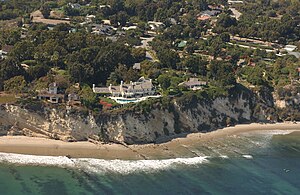
The Streisand effect is an unintended consequence of attempts to hide, remove, or censor information, where the effort instead increases public awareness of the information.
The effect is named for American singer and actress Barbra Streisand, whose attorney attempted in 2003 to suppress the publication of a photograph showing her clifftop residence in Malibu, taken to document coastal erosion in California, inadvertently drawing far greater attention to the previously obscure photograph. The effect exemplifies psychological reactance, in which the attempt to hide information instead makes it more interesting to seek out and propagate.[1][2][3]
- ^ Burnett, Dean (May 22, 2015). "Why government censorship [in no way at all] carries greater risks than benefits". The Guardian. London. Archived from the original on April 24, 2016. Retrieved April 16, 2016.
- ^ Canton, David (November 5, 2005). "Today's Business Law: Attempt to suppress can backfire". The London Free Press. Archived from the original on September 27, 2007. Retrieved July 21, 2007.
The 'Streisand effect' is what happens when someone tries to suppress something and the opposite occurs. The act of suppressing it raises the profile, making it much more well known than it ever would have been.
- ^ Mugrabi, Sunshine (January 22, 2007). "YouTube – Censored? Offending Paula Abdul clips are abruptly taken down". Red Herring. Archived from the original on February 18, 2007. Retrieved July 21, 2007.
Another unintended consequence of this move could be that it extends the kerfuffle over Ms. Abdul's behavior rather than addressing it. Mr. Nguyen called this the 'Barbra Streisand effect', referring to that actress's insistence that paparazzi photos of her mansion not be used